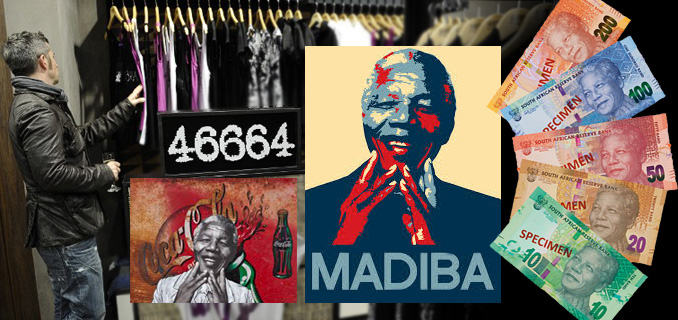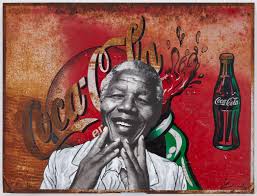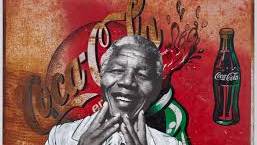Family, politicians battle over “Brand Mandela”

As long as you don’t dig too deeply into the dirt on Nelson Mandela’s past, then the iconic image of Mandela (or Mandiba, his clan name) has fantastic marketing power. The world governments and controlled media with their over-the-top reportage on Saint Mandela use this cult of personality for their own purposes. Never do they touch on the reality of Mandela the man, or his true history.
Back home in South Africa however, Mandela’s own friends, family and politicians battle over there rights to put his name and image to use - cashing in on Brand Mandela.
[“Saint” Mandela? Not So Fast! ]
[The Legacy of Nelson Mandela: A Dissenting Opinion]
Interestingly, the AIDS charity ’46664’ is based on Nelson Mandela’s Robin Island prison number.
---
Family, politicians battle over “Brand Mandela”
By Jack Blood | Deadline Live
 From political posters to bottles of wine and kitchen aprons, the face and name of Nelson Mandela are a potent commercial and political brand in South Africa. Little wonder it’s so sought after – and the source of occasional squabbles.
From political posters to bottles of wine and kitchen aprons, the face and name of Nelson Mandela are a potent commercial and political brand in South Africa. Little wonder it’s so sought after – and the source of occasional squabbles.Following his death on Thursday at the age of 95, the scramble for control of the Mandela legacy – both financial and moral – will involve his family, the ruling African National Congress (ANC), and the Nelson Mandela Foundation he set up to protect his broader message.
At stake is the inheritance that will go to Mandela’s more than 30 children, grandchildren and great grandchildren, some of whom already use the Mandela name and image to market everything from clothing to reality TV.
There are also the Mandela brands and trademarks that help fund the Foundation. And for the ANC, Mandela’s reputation as an anti-apartheid hero is worth votes for years to come.
There are no available public figures of Mandela’s wealth, making it difficult to put an exact value on his estate, which includes an upscale house in Johannesburg, a modest dwelling in his rural Eastern Cape home province, and royalties from book sales including his autobiography “Long Walk to Freedom”.
Several South African branding experts have declined to estimate the annual value of Mandela’s trademark and brands.
Maintaining control over the copyrights is already a difficult business; protecting the Mandela brand may be even harder now that he is gone.
“The beauty of the Nelson Mandela brand is that it has been lived by him exactly as it has been presented by him. His behaviour is his brand,” said Jeremy Sampson, the executive chairman of Interbrand Sampson de Villiers.
“In the rush to commercialize it, we run the risk of watering down or destroying the good that the brand stood for purely with the crassness of finance,” he added.
“GOOD LORD”
Mandela divided the management of his legacy between a series of trusts to handle his finances and the Nelson Mandela Foundation, which serves as custodian of his wider moral legacy.
In total, he set up about two dozen trusts, mostly to pay for the education of his grandchildren and great grandchildren.
It hasn’t all been straight forward.
A legal tussle between Mandela’s long-time friend, lawyer George Bizos, and two of Mandela’s daughters became public this year as the daughters sought to have Bizos and other Mandela associates ousted from companies set up to sell his handprint for use in art and memorabilia.
According to an affidavit filed by Bizos and the others, the two daughters, Makaziwe Mandela and Zenani Dlamini, had been trying to gain control of the main Mandela Trust since 2005 and eventually became trustees without Mandela’s knowledge.
Mandela became angry when he found out what the daughters had done, Bizos and the other associates said in the affidavit.
“Mr Mandela was shocked and used a common expression ‘Good Lord!’ He was most infuriated and wanted to know what had happened.”
A portion of the revenue from the Foundation’s 46664 clothing line – named after Mandela’s prisoner number on Robben Island – and the artworks also goes to pay for family members’ education, according to Bizos.
“The trust has adopted the procedure of requiring the applicant for money to furnish an invoice,” Bizos said, adding that every request accompanied by proper paperwork has been granted.
But some family members have asked for a lump sum payment of 12 million rand, he added.
Such demands fuel the notion, widely held in South Africa, that some of Mandela’s children have exploited their father. Makaziwe, Mandela’s eldest daughter, bristles at that.
“This is what we are, in a sense, entitled to, that my father worked for, and he did it with his own hands to create something for the welfare and upkeep of himself and his children,” she told the Financial Times in April.
“If everybody wants a little bit of the Madiba magic, why is it so sacrilegious for the rightful owners … to use the Madiba magic?” she said, referring to her father by his clan name.
MARKETING A MEMORY
The Nelson Mandela Foundation, which runs the Nelson Mandela Centre of Memory in Johannesburg, was set up as the official custodian of Brand Mandela. It owns more than a dozen copyrights and trademarks for Mandela, which it uses for fundraising and charitable works.
As well as the “46664″ number, its copyrights include the “Nelson Mandela” name, the clan name “Madiba” by which he is widely known, and “Rolihlahla”, which was Mandela’s given name.
Income those brands generate – “46664″ runs as a charity that sells wristbands and mobile phone starter packs, for instance – helps pay for the running of the Foundation’s Centre of Memory, which is the main research and archive centre for Mandela, and which often spoke on his behalf as his health faded.
In all, the foundation had net income of 22 million rand in 2012 and assets of 290 million rand. In 2011 net income totalled 33 million rand and assets came to 262 million.
It paid Mandela 2.8 million rand in 2011 and 2.9 million rand last year for the book it published with his help called “Conversations with Myself,” which was a follow-up to his autobiography “Long Walk to Freedom.”
“We do not commercialize our trademarks, however we do undertake publications like ‘Conversations with Myself’ … for educational purposes,” said Heather Henriques, intellectual property and governance manager at the Centre of Memory.
Separately, the Nelson Mandela Children’s Fund has rights to use the Mandela name for fundraising. Between 1995 and 2012 the fund brought in 1.2 billion rand in income and paid out 462 million rand in grants.
[...]
Read the full article at: deadlinelive.info
READ: The Great Martin Luther King Copyright Conundrum
AND: Selling Mandela: From t-shirts to TV shows, how Madiba became a brand
Tune into Red Ice Radio:
Dominick Ohrbeck - Reptilian Marketing vs. The HeartBrain Model
Michael Tsarion - The Marketing Industry, Teenagers & The Subversive Use of Sacred Symbolism in the Media
Stewart Swerdlow - Colors, Archetypes, Symbols & Mind Control
Gavan Kearney - Hour 1 - The State of the Art, Corrosive Counter-Culture & Attack on Beauty
Eldon Taylor - Subliminal Programming, Media Persuasion, Mind Control & Breaking the Spell
Stephan Kinsella - Hour 1 - Against Intellectual Property






















